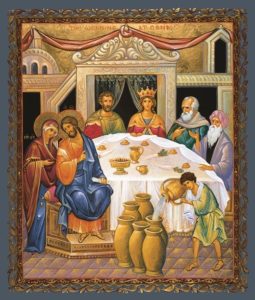Mount Calvary Church
Eutaw Street and Madison Avenue
Baltimore, Maryland
A Roman Catholic Parish
The Personal Ordinariate of the Chair of S. Peter
Rev. Albert Scharbach, Pastor
Dr. Allen Buskirk, Choirmaster
January 20, 2019
10 A.M. Sung Mass
Epiphany II
___________________
Common
An Anglican Folk Mass, Martin Shaw
___________________
Anthems
William Byrd (1538-1623)
O sacrum convivium, in quo Christus sumitur;
recolitur memoria passionis ejus;
mens impletur gratia;
et futurae gloriae nobis pignus datur. Alleluia.
O sacred banquet, wherein Christ is received;
the memorial of his passion is renewed;
the soul is filled with grace;
and a pledge of future glory is given to us. Alleluia.
Sung by Alamire.
_________
Words, George Herbert (1593-1633); Music, Ralph Vaughan Williams (1872-1958)
Love bade me welcome; yet my soul drew back,
Guilty of dust and sin.
But quick-eyed Love, observing me grow slack
From my first entrance in,
Drew nearer to me, sweetly questioning
If I lack’d anything.
‘A guest,’ I answer’d, ‘worthy to be here:’
Love said, ‘You shall be he.’
‘I, the unkind, ungrateful? Ah, my dear,
I cannot look on Thee.’
Love took my hand and smiling did reply,
‘Who made the eyes but I?’
‘Truth, Lord; but I have marr’d them: let my shame
Go where it doth deserve.’
‘And know you not,’ says Love, ‘Who bore the blame?’
‘My dear, then I will serve.’
‘You must sit down,’ says Love, ‘and taste my meat.’
So I did sit and eat.
Sung by baritone Jamie H. Hall.
_________________
Hymns
All praise to Thee, O Lord is by the Anglican clergyman Hyde Wyndham Beadon (1812–1891). The hymn reflects upon the miracle of Cana. Jesus’ word is creative: it alone changes water into wine. This miracle is a foretaste of the wedding feast of the Lamb, which we both anticipate and participate in when we receive the Eucharist: For by Thy loving hand/ Thy people still are fed;/ Thou art the cup of blessing, Lord,/ And Thou the heavenly bread.
The tune ST. THOMAS is by William Williams (1717–1791), a Calvinist Methodist and prolific composer of Welsh hymns.
How welcome was the call is by Henry Williams Baker (1821–1877), an Anglican clergyman who also composed the paraphrase of Psalm 23, The King of love my shepherd is.
The tune ST. MICHAEL is by Loys “Louis” Bourgeois (c. 1510 – 1559), a French composer and music theorist of the Renaissance. He is most famous as one of the main compilers of Calvinist hymn tunes in the middle of the 16th century. Calvinists’ important contributions to church music, such as the exquisite three-part settings of all 150 psalms (for domestic use!) by the Huguenot Claude Goudimel, are often forgotten.
Songs of thankfulness and praise (SALZBURG) is by Christopher Wordsworth (1807—1885), Anglican bishop of Lincoln and nephew of teh poet. The hymn recapitulates the successive manifestations of Christ presented in the preceding weeks and in the original version looks forward to the ultimate epiphany of His second coming. The hymn is typical of Wordsworth’s didactic method, in which each event is marked out (almost as if by a bullet point) by the repeated word manifest and the message is further brought home by the refrain God in man made manifest.
